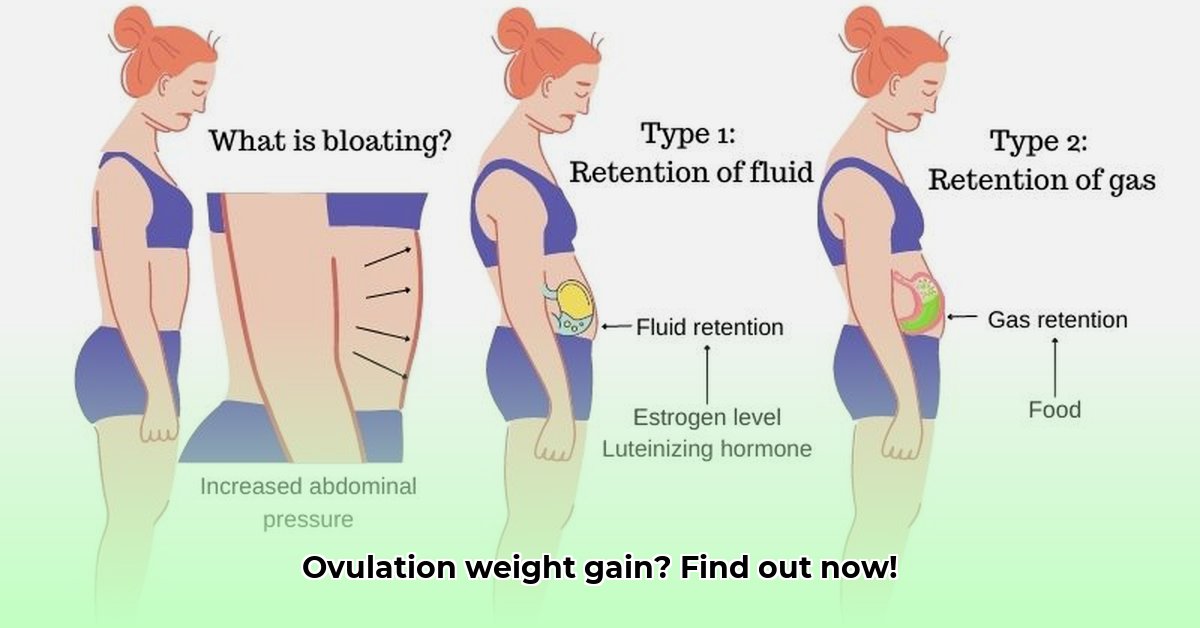Ever notice you feel a bit puffier around ovulation? Lots of women do! It’s common to experience weight changes during your period, and it can be frustrating. This article will explain what’s actually going on with your body during ovulation and why you might feel heavier. We’ll bust some myths, and most importantly, give you practical tips to manage those pesky bloat and weight fluctuations so you feel your best all month long. Let’s get to the bottom of this together! Feeling tired around ovulation is also common; learn more about ovulation fatigue.
Do You Gain Weight During Ovulation and Fluid Retention
It’s a common question many women ask: Do I actually gain weight around ovulation? The short answer is: you might. But don’t panic! It’s usually just temporary and mostly due to water retention, not actual fat storage. Let’s dive into the details to understand what’s going on with your body and how to manage bloating.
The Hormonal Highs and Lows of Your Cycle: Estrogen and Progesterone
Your menstrual cycle is a fascinating, intricate process, a true hormonal rollercoaster. Throughout the month, your body’s hormone levels rise and fall, orchestrating a complex symphony of physical changes. During ovulation – that crucial point in your cycle when you’re most fertile – estrogen and progesterone levels spike. These hormonal surges can trigger your body to retain more water than usual, leading to that familiar bloated feeling and a slightly higher number on the scale. Think of it like a sponge soaking up extra water; your body’s temporarily holding onto more fluid. This is completely normal and nothing to worry about. Did you know these hormonal shifts influence appetite, sometimes leading to cravings?
How Much Weight Fluctuation Should I Expect and cycle changes
The amount of weight fluctuation varies widely from woman to woman. Most women report a weight increase of between one and five pounds during ovulation. This often manifests as bloating – that uncomfortable feeling of fullness and tightness – rather than a noticeable increase in body fat. Crucially, this temporary weight gain usually disappears within a few days after ovulation, as hormone levels normalize and your body releases the excess fluid. Don’t let those numbers on the scale stress you out; it’s a normal part of the cycle. Is this weight gain actual fat, or just temporary water retention?
Beyond the Water: Appetite Changes and Other Factors Impacting Weight
While water retention is the primary reason for weight changes around ovulation, changes in appetite also play a significant role. Many women report feeling hungrier than usual during this time, sometimes experiencing intense cravings. This isn’t a psychological trick; those fluctuating hormones directly impact your appetite and food preferences. However, rest assured, these increased cravings and hunger pangs are most likely temporary. What role does increased hunger play in ovulation-related weight changes?
Dispelling the Myths Surrounding Ovulation Weight Gain and body fat
Let’s tackle some common misconceptions. The weight gain during ovulation is almost exclusively due to fluid retention, not the accumulation of body fat. It’s not a sign of poor health, nor does it indicate any underlying medical issues. While consulting your doctor is always a good idea if you have any concerns, in most cases, temporary weight fluctuations during ovulation are simply a natural part of your cycle. What are common misconceptions about weight gain during ovulation?
Practical Strategies to Ease Bloating and Discomfort Naturally
While completely eliminating weight fluctuations around ovulation might be difficult, there are simple steps you can take to minimize bloating and discomfort by using the right diet, and lifestyle:
- Hydrate, Hydrate, Hydrate: Ironically, drinking plenty of water can help reduce water retention. It sounds counterintuitive, but staying well-hydrated helps your body flush out excess fluids more efficiently.
- Cut Back on Salt: Excessive salt intake exacerbates water retention. Try to reduce your consumption of processed foods, salty snacks, and heavily salted dishes. Opt for fresh, home-cooked meals whenever possible.
- Embrace Fiber: A diet rich in fiber promotes regular bowel movements. This aids in preventing fluid buildup and alleviates bloating. Increase your intake of fruits, vegetables, and whole grains.
- Prioritize Protein: Protein-rich meals and snacks help you feel full and satisfied for longer, curbing those ovulation-related cravings.
- Gentle Movement: Regular, gentle exercise, like brisk walking, yoga, or swimming, can boost circulation and help reduce bloating. Aim for at least 30 minutes of moderate-intensity activity most days of the week.
When to Seek Professional Medical Advice and underlying conditions
While it’s perfectly normal to experience temporary weight changes around ovulation, persistent or unusually severe symptoms warrant a visit to your healthcare provider. If you notice significant, prolonged bloating, unexplained weight gain that isn’t related to your cycle, or other concerning symptoms, schedule an appointment with your doctor or gynecologist. They can help determine if there’s an underlying medical condition requiring attention. What concerning symptoms should prompt a visit to the doctor?
Tracking Your Cycle: Understanding Your Body’s Rhythm and symptoms
Tracking your menstrual cycle can provide valuable insight into your body’s unique patterns. Many smartphone apps and online resources are available to help you monitor your cycle, record your symptoms, and identify any unusual changes. This empowers you to proactively manage your symptoms and adjust your lifestyle accordingly. Understanding your body’s rhythm is key to managing your overall well-being.
It’s important to remember that you’re not alone. Many women experience weight fluctuations around ovulation. By understanding the underlying hormonal changes and implementing simple lifestyle adjustments, you can navigate this normal physiological process with ease and confidence. Focus on overall health and well-being, and be kind to yourself during this time.
How to Reduce Bloating During Ovulation Naturally and diet influence
Do you experience that uncomfortable puffiness around ovulation? Many women do. It’s often linked to hormonal shifts, specifically the surge in estrogen and progesterone. But what can you do to alleviate this common discomfort? Let’s explore some effective strategies to reduce bloating.
Understanding the Hormonal Rollercoaster and hormone levels
Ovulation, that magical mid-cycle moment when your body prepares for potential pregnancy, triggers a hormonal cascade. Estrogen and progesterone levels rise, causing your body to retain more water – that’s the main culprit behind the bloating. This isn’t necessarily weight gain in the traditional sense; it’s fluid retention. Think of it like a sponge soaking up extra water. What exactly causes bloating during ovulation?
Dietary Strategies for Bloat Relief and the right food
What you eat plays a significant role. How to reduce bloating during ovulation naturally often starts with tweaking your diet.
- Limit salt: Salt makes your body hold onto water. Cut back on processed foods, salty snacks, and heavily salted meals.
- Boost potassium: Potassium helps counteracts the effects of sodium. Incorporate potassium-rich foods like bananas, sweet potatoes, and spinach.
- Embrace magnesium: Magnesium supports fluid balance. Good sources include dark chocolate (in moderation!), almonds, and avocados.
- Hydrate wisely: While it seems counterintuitive, staying well-hydrated helps flush out excess fluids.
- Mindful eating: Pay attention to your body’s signals. Avoid overeating, and eat slowly to aid digestion.
Lifestyle Changes for a Flatter Tummy and fluid balance
Beyond diet, lifestyle tweaks can make a real difference:
- Gentle exercise: Regular physical activity promotes circulation and reduces water retention. Opt for activities you enjoy, like yoga, walking, or swimming.
- Stress management: Stress can exacerbate bloating. Practice relaxation techniques like deep breathing or meditation.
- Probiotic power: Certain probiotics can improve gut health, which can indirectly alleviate bloating. Discuss probiotic supplements with your doctor. Consider incorporating fermented foods like yogurt or kefir into your diet.
When to See a Doctor and reproductive health
While most ovulation bloating is temporary and manageable, persistent or severe bloating could indicate an underlying condition. Consult your healthcare provider if:
- Bloating is exceptionally intense or prolonged.
- You’re experiencing other concerning symptoms, like pain or irregular periods.
- You have concerns about your reproductive health, such as PCOS or endometriosis.
Key Takeaways for healthy diet
- Ovulation bloating is often caused by hormonal changes.
- Diet modifications, including reducing salt intake and increasing potassium and magnesium, can significantly help.
- Lifestyle changes like gentle exercise and stress management are crucial.
- Probiotics may offer additional support.
- Persistent or severe bloating warrants a medical consultation.
Managing Ovulation Weight Fluctuations: A Holistic Approach for Women and tracking cycle
Key Takeaways:
- It’s completely normal to experience slight weight changes around ovulation. Think of it as your body’s natural rhythm.
- These fluctuations, usually 1-5 pounds, are mainly due to water retention. Hormones are the key players here.
- It’s not fat gain; it’s temporary fluid shifts. Deep breaths—this passes!
- You can manage these fluctuations with simple lifestyle tweaks.
- If you’re really concerned, chat with your doctor.
The Mystery of the Mid-Cycle Weight Shift and hormonal influence
Have you ever noticed a little extra weight around ovulation? Don’t worry, you’re not alone! Many women experience a slight weight increase mid-cycle, often accompanied by bloating. This isn’t necessarily about gaining fat; it’s primarily about water retention. What causes this mid-cycle weight shift?
Your hormones, particularly estrogen and
- Stainless Steel Food Storage for Healthier, Eco-Friendly Meal Prep - February 27, 2026
- Stainless Food Containers Offer Durable Storage for Everyday Meals - February 26, 2026
- Stainless Steel Containers Offer Superior Food Preservation and Durability - February 25, 2026










